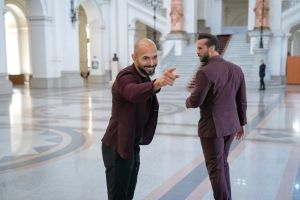Decisions have consequences. How do you make good ones?

“Multitudes multitudes in the valley of decision, for the day of the Lord is near.” – Joel 3:14
Decisions determine the direction of our life. The direction of our life determines our destiny. The average adult makes as many as 35,000 decisions a day. Many of them are mindless, but more than 70 decisions each day are those that make a tangible difference. Decisions have consequences. The issue is, how do you make good ones?
God created us to make decisions. Our capacity to make choices separates us from animals. Yet throughout history, you can see a lot of people who used their free will to make really bad decisions.
In 1979, Xerox showed Steve Jobs a mouse-driven computer interface that they didn’t think was a big deal. Bad decision. Jobs used the technology, founded Apple Computer and the rest is history.
In 1962, Dick Rowe of Decca Records didn’t sign the Beatles to a contract because he thought guitar rock groups were dead. Bad decision.
In 1941, Japan invaded Pearl Harbor. In 1899, a man named Asa Candler sold the bottling rights to Coca-Cola for one dollar. In 1846, the Donner Party took a shortcut through the mountains, got stranded, and resorted to cannibalism to survive. In 1812, Napoleon invaded Russia and lost 300,000 soldiers — and his nation. All bad decisions.
Even further back, Adam took a bite out of the fruit. Cain killed his brother Abel. Lot’s wife looked back and turned into a salt statue. Abraham had a child with a maid and those consequences continue today. Bad, bad, bad.
Everyone will at some time make a bad decision. I’ve made too many to count, and I don’t really want to recount them.
Some people date the wrong person. Others choose the wrong career. Many sell their houses at the wrong time or buy a car they can’t afford.
How can we tip the odds and make more good decisions than bad decisions?
We can recognize that every day is a new day of decision, just as Moses recorded in Deuteronomy: “This day I call the heavens and the earth as witnesses against you that I have set before you life and death, blessings and cursings. Now choose life so that you and your children may live” (Deuteronomy 30:19).
And “I’m setting before you today a blessing and a curse. The blessing if you obey the commands of the Lord your God. The curse if you disobey the commands of the Lord your God” (Deuteronomy 11:26).
God wanted the Israelites to remember to make good decisions, so he directed them to stand on two mountains — Mount Gerizim and Mount Ebal — and shout out the choices of the blessings and cursings. Years later, Joshua stood between those two mountains in a place called Shechem and made his famous “line in the sand” speech: “Choose for yourselves this day whom you will serve … but as for me and my household, we will serve the Lord” (Joshua 24:15).
Israel’s response that day stands as one of the greatest decisions in the history of the world.
Each day, we can stand like Joshua in Shechem and have the opportunity to make the best decision of our lives. How do we do it? The following seven keys are critical to good decisions:
- Meditate on scripture. Immerse your mind in the will of God in Scripture. God promises good success to those who meditate on his word day and night.
- Obey God. You can’t expect to hear from God if you haven’t obeyed the last thing He told you.
- Consult the right people and the right sources. This includes choosing the right friends.
- Do your homework. Know what you’re buying — and what you’re buying into.
- Consider the long-term consequences. What will this choice mean six months from now? Or a year from now?
- Pray and ask God for help. Be humble enough to say, “God, I need you.” Ask outright, “Lord, is it a yes or a no?”
- Be sensitive to the Holy Spirit. God is speaking at all times. Don’t try to figure out everything on your own. Trust God from the bottom of your heart.
These seven keys may take years to learn. The best way to learn is to start today. Of the many bad decisions I’ve made in my life, because of learning these keys, I’ve also made some great ones — many that absolutely astonished me.
Some years back, a friend asked me to lead youth ministries in his state and pastor a small church. Lisa and I were living near our families and felt very blessed where we were. I told my friend, “No.” He answered, “We’ll keep praying.”
Within three days of that call, all hell broke loose. I thought my life was falling apart. I called my friend back and said, “Can we still come?” Within a month of arriving where he’d invited us, I was asked to become the international youth director of an entire denomination.
How did God open a door we’d never dreamed of? We went from a bad decision to a good decision by using those seven keys.
If you’re young, the decision to marry is at the top of your list. But the most important decision in anyone’s life is to choose what you will do with Jesus. Even for people who have a long history of bad decisions, one good decision to follow Christ will change everything.
And if you’re following Christ, then stand in Shechem with Joshua every day and follow those keys to make the choices that lead you further and further into God’s will and God’s blessings for your life.
Dr. William M. Wilson is the president of Oral Roberts University (ORU) in Tulsa, Oklahoma. Dr. Wilson is instrumental in developing Spirit-empowered leaders through whole person education to impact the world. He is known as a global influencer and a dynamic speaker with four decades of executive leadership experience. Wilson’s weekly television program, “World Impact with Dr. Billy Wilson” has been inspiring viewers in over 150 nations and multiple languages since 1998.
As Global Co-chair of Empowered21, which attracts Spirit-empowered principals from ministry, academics, and next-generation voices. Wilson is the Chair of the historic Pentecostal World Fellowship and holds leadership positions with the National Association of Evangelicals, Mission America Coalition, International Christian Embassy Jerusalem, American Association of Presidents of Independent Colleges and Universities, and the City of Tulsa Chamber of Commerce.




























